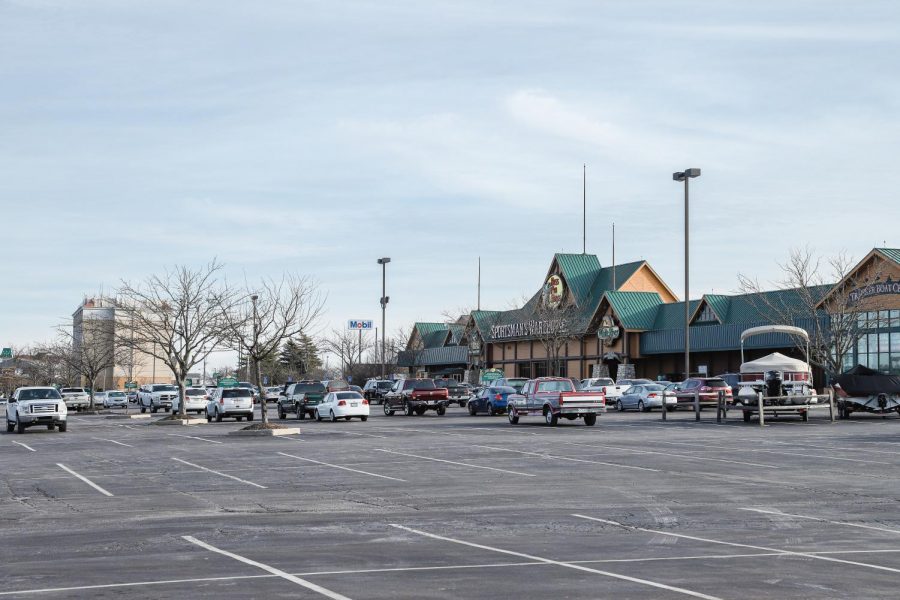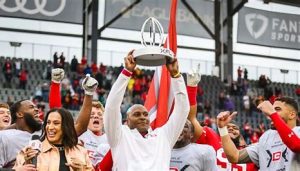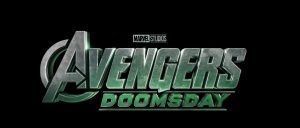St. Charles developing ‘smart parking’ system
Photo by James Tananan Kamnuedkhun
The parking lot at Bass Pro Shops on Boone’s Lick Road may be a place where Main Street visitors will be able to park and take a shuttle to downtown St. Charles if lots are full.
January 17, 2020
St. Charles City and County are planning to use technology to solve parking problems in downtown St. Charles.
A smart parking system, planned to roll out next year, will use cameras to monitor parking availability and will shuttle guests from other areas to downtown St. Charles during special events.
The tax-funded project has the goals of reducing carbon emissions and growing the city’s tourism capacity.
Brad Temme, Director of Engineering for the City of St. Charles, said the town suffers from limited parking during special events in the downtown district. Hundreds of thousands of people come to events like Festival of the Little Hills, but there are only 3200 parking spaces downtown. Because of this, drivers said in a survey they spend an average of nine minutes looking for a spot.
“With the inavailability [sic] of parking and it being such a challenge to get people into parking spaces, it can, over time, diminish our ability to draw that many people downtown, because, ‘Hey, it was such a hassle last time I went. Why would I come back to St. Charles?’” Temme said.
When lots downtown are full, the smart parking plan will use digital road message boards to redirect visitors to park in other lots, including at the Streets of St. Charles, Family Arena, Convention Center, and the Bass Pro Shops shopping center. Electric shuttles will then take them to the downtown area.
Temme said the project will cost $1 million in total. St. Charles taxpayers will pay $100,000, the county will pay another $100,000, and the rest of the funding will come from a federal grant to reduce air emissions.
The city council unanimously voted to fund the plan last week.
The program’s parking data may be used in a navigation app such as Waze to show where parking is available.
In a city council meeting last month when the plan was discussed, Mayor Dan Borgmeyer joked, “So you could drive down Main Street looking at your phone to see if there’s any parking spaces?”
Temme said it is not intended for the app to distract drivers.
Similar parking projects are already in place in East and West Coast cities, but this would be the first in the St. Louis area, he said.
St. Charles City Traffic Engineer Matt Seggerman said the plan is estimated to reduce daily greenhouse gas emissions from cars by 30 percent from drivers spending less time looking for parking. After it is implemented, there will be a study to determine its actual impact on air quality. There are not formal estimates for how much money the project will bring to the city’s economy.
Temme said because of land prices in St. Charles, it is more efficient to bring people to events from other parts of town, rather than building new parking facilities downtown. For the $1 million to be spent on the plan, the city could only build 50 parking spaces.











Patrick Noon • Jan 19, 2020 at 12:40 pm
If the project only covers 3,200 spaces it’s definitely not the best use of tax and grant money. Cameras are only effective in big and well lit surface lots. In downtown on-street parking they turn out to be very expensive and inaccurate. Sensor technologies would allow connecting same 3,200 spaces with a 1/3 of $1M budget, $330K tops: https://www.nwave.io/solutions/municipalities/
Jimmy H • Jan 19, 2020 at 4:34 am
I don’t know why we need to waste a million dollars on this. Sure, parking is an issue. But, I’ve seen shuttles going from places like EPC at Cave Springs before. Or people just taking Uber to downtown. And, we wonder why taxes are so high?
Joyce Cartwright • Jan 18, 2020 at 11:35 am
The “smart parking” idea, new to our area, should be a welcomed solution to alleviate part of the parking crunch in and around the downtown St. Charles area.
For decades, St. Charles and St. Charles County have supported overflow traffic and lodging for tourists who converge upon the Greater St. Louis area during city and county events. And OUR area benefits from doing so. The mindset seems to be,”Hey, while we’re here we may as well check out what’s up on THIS side of the bridge.”
Our downtown and surrounding businesses, restaurants, lodging facilities, casinos, nearby wineries, etc., all the way past Wentzville and Hermann benefit from this overflow.
It IS important to ensure that locals and tourists see St. Charles in a positive light during a specific event. What is MORE important, though, is doing everything possible so their first experience while attending a venue is pleasant, exciting and memorable enough for them to want to return AND to pass the word along to others. Adequate parking is right up there at the top of the list. This is such a fabulous community with so much to offer.
It is wonderful to see this simple yet progressive action being set in motion to address the issue of parking in such a positive way for Metro St. Charles. I’m very excited to see what other innovative ideas are in the works for our area.
Congratulations to all who collaborated on this “smart parking” project!
Bob • Jan 17, 2020 at 7:25 pm
Parking has almost always been an issue in St. Charles, especially during certain event periods, usually in the fall and early winter. The one issue that they need to address is the condition of the roads in the historic district. I’m sure that the roads are reasonably authentic, but I don’t think that they were built with humps and craters that are capable of tearing up a 4 wheel drive truck, let alone a normal car. I’m not asking for roads as smooth as a country blacktop, but there are definitely some room for improvement and still maintain a significant amount of the authenticity
Patrick Noon • Jan 17, 2020 at 1:20 pm
It’s great to see that cities are taking smart decisions and started using technology instead of building more parking lots! We have been preaching this approach for years! My article in Parking Today magazine:https://www.nwave.io/news/why-more-parking-isnt-always-the-best-answer/